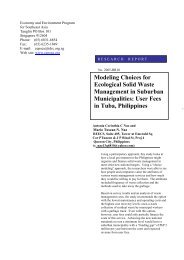systems research - the IDRC Digital Library - International ...
systems research - the IDRC Digital Library - International ...
systems research - the IDRC Digital Library - International ...
You also want an ePaper? Increase the reach of your titles
YUMPU automatically turns print PDFs into web optimized ePapers that Google loves.
CONCLUSION<br />
The farmers in Pangil did not adopt <strong>the</strong> RWCS technology. They adopted<br />
watermelon as an alternative to rice during <strong>the</strong> DS. When <strong>the</strong>re was adequate<br />
rainfall, <strong>the</strong>y substituted rice for watermelon. Although <strong>the</strong> adopters practiced <strong>the</strong><br />
RWCS technology, almost all cultural practices and <strong>the</strong> management involved were<br />
carried out by a labor-contractor who had experience in watermelon production.<br />
The results suggest that <strong>the</strong> RWCS improved farm income. When <strong>the</strong><br />
adopters phased out <strong>the</strong> production of watermelon in 1991, <strong>the</strong>re was an apparent<br />
reduction in income. Farmers, however, were able to compensate for <strong>the</strong> losses<br />
through o<strong>the</strong>r sources. One of <strong>the</strong> farmers focused his effort on rice production and<br />
cultivated a larger area to make up for <strong>the</strong> loss of income from watermelon. This is<br />
most likely to happen if farmers have large farms. However, if farm size is a limiting<br />
factor, farmers will be inclined to plant watermelon after rice.<br />
The impact of watermelon production on income and expenditure patterns<br />
cannot be generalized. The case study revealed that income from <strong>the</strong> sale of<br />
watermelon was not necessarily reinvested in farm enterprises, but was spent on<br />
unproductive household items. The case study also revealed that farmers had o<strong>the</strong>r<br />
sources that could be used to augment <strong>the</strong>ir income if watermelon was not included<br />
in <strong>the</strong> farming system.<br />
Rice remained a stable component of <strong>the</strong> farming system with or without <strong>the</strong><br />
irrigation system. Citrus, however, has <strong>the</strong> potential to increase income. The RWCS<br />
is a very promising alternative only while <strong>the</strong> irrigation system is not operating.<br />
The experience in Dambo has implications for future development.<br />
Agricultural <strong>research</strong> should not merely focus on cropping <strong>systems</strong> work or deal only<br />
with rainfed agriculture. Research must focus on finding ways to integrate water<br />
management into <strong>the</strong> system. In Dambo, for example, years of cropping <strong>systems</strong><br />
<strong>research</strong> could be wasted because of <strong>the</strong> presence of an irrigation system.<br />
Consequently, farmers in <strong>the</strong> rainfed areas will pay more attention to <strong>the</strong> provision<br />
of <strong>the</strong> required water and will spend excessively on water-resource facilities. This<br />
situation has been experienced by farmers in <strong>the</strong> KABSAKA project where<br />
investments in costly water pumps have been made to guarantee adequate water<br />
supply. The money spent on <strong>the</strong>se facilities could have been invested in a much<br />
more profitable venture. Therefore, it is vital to establish cropping <strong>systems</strong> that will<br />
use limited water resources in <strong>the</strong> rainfed areas while providing reasonable income.
















